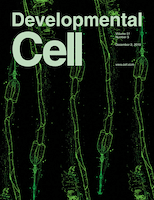
Russian Journal of Developmental Biology
Scope & Guideline
Exploring the intricacies of life’s beginnings.
Introduction
Aims and Scopes
- Developmental Mechanisms:
The journal emphasizes research on the mechanisms underlying development, including cellular differentiation, morphogenesis, and organogenesis. - Genomic Studies:
A significant focus is on the genetic and epigenetic regulation of development, including studies on gene expression, mutations, and evolutionary genetics. - Stem Cell Research:
There is a robust emphasis on induced pluripotent stem cells (iPSCs) and their applications in regenerative medicine, highlighting their differentiation potential and therapeutic uses. - Comparative Developmental Biology:
Research comparing developmental processes across different species provides insights into evolutionary biology and the conservation of developmental pathways. - Environmental Influences:
The journal also covers how environmental factors affect developmental processes, including the impact of temperature, nutrition, and stress on growth and development. - Morphological Studies:
Detailed morphological studies contribute to understanding the structural aspects of development in various organisms, from embryonic stages to adult forms.
Trending and Emerging
- Induced Pluripotent Stem Cell Applications:
The generation and application of iPSCs have become a focal point, with numerous studies exploring their potential in disease modeling, regenerative medicine, and therapeutic strategies. - Molecular Mechanisms of Differentiation:
Research uncovering the molecular pathways and signals that guide cell differentiation processes is gaining traction, providing deeper insights into developmental biology. - Impact of Environmental Factors:
An increasing number of studies are examining how various environmental stressors affect developmental processes, emphasizing the importance of ecological and evolutionary perspectives. - Technological Advances in Imaging and Analysis:
The use of advanced imaging techniques and computational tools for analyzing developmental processes is on the rise, enabling more detailed and dynamic studies of embryogenesis. - Interdisciplinary Approaches:
There is a growing trend towards interdisciplinary research, integrating developmental biology with fields such as bioinformatics, synthetic biology, and systems biology to tackle complex biological questions.
Declining or Waning
- Epigenetics in Development:
While epigenetic mechanisms were previously a prominent topic, recent publications suggest a decreased focus on this area, possibly due to saturation in the field and a shift towards more applied research. - Comparative Physiology of Non-Model Organisms:
The exploration of physiological aspects in non-model organisms appears to be declining, as more studies concentrate on model organisms or translational research that has immediate clinical relevance. - Historical Perspectives in Developmental Biology:
There is less emphasis on historical reviews and theoretical discussions of developmental biology concepts, indicating a trend towards more empirical and experimental research.
Similar Journals

Annual Review of Cell and Developmental Biology
Unveiling Insights in Cell and Developmental ResearchThe Annual Review of Cell and Developmental Biology, published by Annual Reviews, stands as a premier journal in the fields of cell biology and developmental biology. Established in 1995, this influential journal has continuously provided comprehensive and critical reviews that synthesize the latest findings in these vibrant research areas, catering to the interests of researchers, professionals, and students alike. With an impressive impact factor, the journal ranks in the top quartile (Q1) for both Cell Biology and Developmental Biology, boasting remarkable Scopus rankings—#1 in Developmental Biology and #22 in Cell Biology. This emphasizes its significance and authority within the academic community. Although the journal does not operate under an open-access model, it remains a crucial resource for those seeking to stay at the forefront of scientific discoveries and theoretical advancements. The Annual Review of Cell and Developmental Biology continues to solidify its status as an essential platform for sharing knowledge and stimulating scientific inquiry.

DEVELOPMENTAL CELL
Advancing Knowledge in Developmental BiologyDEVELOPMENTAL CELL, published by CELL PRESS, stands as a premier journal in the fields of Biochemistry, Genetics and Molecular Biology, Cell Biology, and Developmental Biology. With a significant influence evidenced by its Q1 rankings across several categories in 2023 and a remarkable Scopus ranking placing it at the 98th percentile for Developmental Biology, this journal is pivotal for researchers and academics aiming to advance their understanding of cellular processes. Covering a broad range of topics from molecular mechanisms to cellular developmental pathways, DEVELOPMENTAL CELL publishes cutting-edge research articles that contribute to the dynamic landscape of cell biology and related disciplines. Although it does not currently offer open access, the journal is accessible through institutional subscriptions, reinforcing its commitment to disseminating high-quality scientific knowledge produced by leading experts in the field. Based in the United States, DEVELOPMENTAL CELL continues to push the boundaries of discovery and innovation in life sciences, making it an essential resource for professionals, researchers, and students alike in the quest for foundational biological insights.

Organogenesis
Unveiling the Complexities of Organogenesis.Organogenesis is a leading journal published by Taylor & Francis Inc, dedicated to advancing the field of developmental biology and regenerative medicine. With an ISSN of 1547-6278 and E-ISSN 1555-8592, this journal spans an extensive research scope that includes embryology, transplantation, and biomedical engineering, distinguishing itself as a crucial platform for researchers and practitioners alike. Its impact is reflected in its performance across various categories in 2023, earning Q3 rankings in Biomedical Engineering and Embryology, Q4 in Developmental Biology, and Q2 in Transplantation, showcasing its reputable standing among peer journals. Moreover, with Scopus rankings indicating strong positioning in the fields of medicine and biochemistry, Organogenesis is essential for those looking to publish or stay updated on pioneering research. The journal facilitates rigorous peer-review and offers a forum for disseminating innovative findings, making it an invaluable resource for academics, professionals, and students committed to understanding the complexities of organism development.

Cell Discovery
Empowering Open Access to Cutting-Edge ResearchCell Discovery, published by SPRINGERNATURE, is a premier open access journal in the dynamic fields of Biochemistry, Cell Biology, Genetics, and Molecular Biology. Since its inception in 2015, this journal has established itself as a key platform for disseminating high-impact research and is recognized with a Q1 ranking across all its core categories for the year 2023. With its remarkable Scopus rankings—7th in Genetics, 9th in Biochemistry, 13th in Molecular Biology, and 15th in Cell Biology—Cell Discovery positions itself among the elite journals in life sciences, showcasing the most innovative breakthroughs and comprehensive reviews. Based in the United Kingdom, this journal operates under an open access model, ensuring that groundbreaking discoveries are readily available to researchers, professionals, and students around the globe. With a commitment to advancing scientific knowledge, Cell Discovery welcomes contributions that push the frontiers of our understanding in cellular and genetic sciences.

CURRENT OPINION IN GENETICS & DEVELOPMENT
Leading discussions in genetic mechanisms.CURRENT OPINION IN GENETICS & DEVELOPMENT is a prestigious journal published by CURRENT BIOLOGY LTD that offers an insightful platform for the latest developments and emerging trends in the fields of genetics and developmental biology. Established in 1991 and set to continue until at least 2024, this journal achieves notable recognition in the academic community with a Q1 classification in both its major categories as of 2023. With a Scopus rank placing it within the top quartile for both genetics and developmental biology, it serves as an essential resource for researchers, professionals, and students seeking to enhance their understanding of genetic mechanisms and developmental processes. While currently not an open-access journal, readers can explore the collection of high-quality articles that contribute to shaping contemporary scientific discourse and fostering innovation within these dynamic fields. For those dedicated to advancing their research and knowledge, CURRENT OPINION IN GENETICS & DEVELOPMENT stands as a vital and influential academic publication.

DEVELOPMENTAL BIOLOGY
Unraveling the Mysteries of Life's Building BlocksDEVELOPMENTAL BIOLOGY, published by Academic Press Inc., Elsevier Science, stands as a pivotal journal in the fields of cell biology, developmental biology, and molecular biology since its inception in 1959. Renowned for its rigorous peer-review process, this journal serves as a platform for publishing cutting-edge research, reviews, and insights that drive forward our understanding of developmental processes at the cellular and molecular levels. With an impressive track record, it is classified in the Q2 quartile across multiple categories, reflecting its significant impact and relevance in academia and research communities. Although the journal does not provide Open Access options, it remains accessible via numerous academic databases, ensuring a wide reach for researchers, professionals, and students alike. With a commitment to advancing the field, DEVELOPMENTAL BIOLOGY continues to be essential reading for those looking to stay at the forefront of developmental research and its applications.

Cells & Development
Connecting Disciplines to Propel Developmental DiscoveriesCells & Development is a premier journal published by Elsevier, dedicated to advancing the field of Developmental Biology. With an ISSN of 2667-2901 and an impressive Q2 ranking in its category for 2023, the journal endeavors to provide a platform for high-quality research articles that explore cellular mechanisms, developmental processes, and molecular interactions that underpin growth and differentiation. Based in the Netherlands, Cells & Development not only emphasizes the importance of innovative experimental approaches but also encourages interdisciplinary contributions that bridge the gap between basic and applied science. As an Open Access publication, it ensures that research findings are readily accessible to a global audience, significantly enhancing visibility and impact. The journal's commitment to scholarly excellence makes it an essential resource for researchers, professionals, and students aiming to contribute to the dynamic field of developmental biology.

DEVELOPMENT GROWTH & DIFFERENTIATION
Driving Insights into Developmental ProcessesDEVELOPMENT GROWTH & DIFFERENTIATION, published by Wiley, stands as a vital journal in the realms of Cell Biology, Developmental Biology, and Medicine. With an ISSN of 0012-1592 and E-ISSN of 1440-169X, this esteemed journal has been a key player in the scientific community since its inception in 1969, continuing to contribute significantly to the understanding of developmental processes and mechanisms underlying growth and differentiation. Ranked Q3 in Cell Biology and Developmental Biology, and Q2 in miscellaneous aspects of Medicine as of 2023, the journal provides a platform for high-quality research articles, reviews, and critical insights that foster academic discourse in these vital fields. Although currently not available as open access, the journal ensures the availability of essential research to its global readership, facilitating collaboration and innovation. Researchers, professionals, and students alike will find DEVELOPMENT GROWTH & DIFFERENTIATION to be an invaluable resource for advancing knowledge and driving forward the scientific inquiry into the intricacies of biological development.

CELL RESEARCH
Elevating Insights in Cell and Molecular SciencesCELL RESEARCH is a premier peer-reviewed journal dedicated to advancing the field of cell biology and molecular biology, published by SpringerNature. With an impressive impact factor and consistently ranking in the Q1 quartile for both cell biology and molecular biology, this journal serves as a pivotal resource for researchers, professionals, and students seeking to explore the latest discoveries and advancements in cellular mechanisms and their implications for health and disease. Since its inception in 1996, CELL RESEARCH has cultivated a distinguished reputation, currently boasting ranks in the top percentile of Scopus categories, reaffirming its influence and relevance to the scientific community. Although it is not an Open Access journal, its rigorous selection process ensures the publication of high-quality articles that contribute significantly to our understanding of life sciences. For those deeply engaged in the realms of biochemistry, genetics, and molecular biology, CELL RESEARCH is an essential conduit of innovative research and critical insights.

EvoDevo
Leading the Charge in Developmental and Evolutionary ResearchEvoDevo, published by BMC, is a premier open-access journal dedicated to the fields of Developmental Biology, Ecology, Evolution, Behavior and Systematics, and Genetics. With an impressive Q1 ranking in its category for 2023, EvoDevo stands out as a significant resource for researchers, professionals, and students seeking to explore the intricate relationships between evolutionary processes and developmental mechanisms. Since its inception in 2010, this UK-based journal has provided a platform for innovative research and insights, boasting rigorous peer-review standards that ensure high-quality publications. With the E-ISSN of 2041-9139 and a commitment to freely accessible research, EvoDevo is positioned at the forefront of scientific discourse, making vital contributions to our understanding of biological complexities. As the journal converges years from 2010 to 2024, it serves as a cornerstone for knowledge dissemination, inspiring future research trajectories in evolutionary developmental biology.